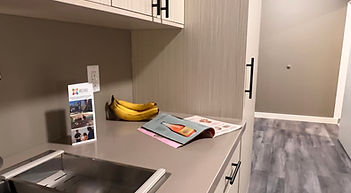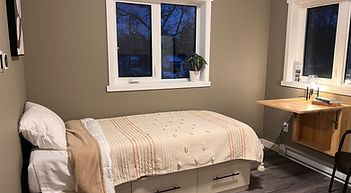
Program Based Housing
Bridge Healing
Too often in Edmonton, people leave the emergency department with nowhere safe to go. Without housing, their health declines and they return to the emergency department, sometimes within hours.
Bridge Healing changes that.

How it works
Created by Dr. Louis Francescutti, an Edmonton emergency department physician, Bridge Healing offers short-term housing for adults who are medically stable but have no safe place to recover after leaving one of the city’s five emergency departments.
Guests stay in private, furnished studio suites. During their stay, our team helps them work toward safe, appropriate housing that meets their needs within their chosen community. We also help with essentials like getting ID, setting up income supports, and building life skills for long-term stability.
Why it matters
-
36 units currently in operation, with plans to expand
-
76% fewer emergency visits for people who move from Bridge Healing into housing
-
57% fewer hospital admissions for the same group
-
$5.1 million in annual healthcare savings compared to a $1.8 million operating cost
Proven results
The Alberta Medical Association’s Business Report found that Bridge Healing’s model works for people and for the healthcare system. When people have a safe place to land, they can recover, plan for the future, and move forward with stability and dignity.
Access
Bridge Healing is funded by Assisted Living Alberta through the Government of Alberta. Referrals are available only through Alberta Health Services (AHS).
.png)
.png)

Recovery in Transition
For people completing medical detox, the wait to enter a residential treatment program can be dangerous. Without a safe, sober environment, many risk a return to substance use or even death before treatment begins.
Recovery in Transition fills that gap.

How it works
Recovery in Transition provides short-term, stability-focused housing for individuals who have completed a clinical detox program, are medically stable, and have a confirmed intake date for residential treatment.
Guests reside in private rooms within a supportive, substance-free setting. During their stay, they work alongside recovery coaches to develop personalized recovery and wellness plans that prepare them for the demands of treatment and for sustained recovery beyond. Structured routines, access to nutritious meals, and coordinated connections to community resources help maintain physical and mental stability throughout this critical transitional phase.
Why it matters
-
Addresses a high-risk period when individuals are most vulnerable to returning to substance use
-
Protects treatment placements by supporting readiness and commitment until intake
-
Builds the skills, planning, and self-efficacy needed for long-term recovery
-
Supports overall health and stability during one of the most vulnerable stages in the recovery process
Program details
-
Short-term housing, meals, and individualized recovery coaching
-
Recovery and wellness planning tailored to each guest’s needs and goals
-
Guests must be medically stable, have completed detox, and have a confirmed treatment intake date
-
No on-site clinical addiction or mental health treatment is provided, but referrals and connections to specialized services are facilitated
Access
Participation in Recovery in Transition is arranged exclusively through medical detox programs. This ensures that every guest is medically stable, has completed detox, and is ready to begin preparing for their treatment program.
The program is funded through Assisted Living Alberta, and through contributions from the Government of Canada.
.png)






